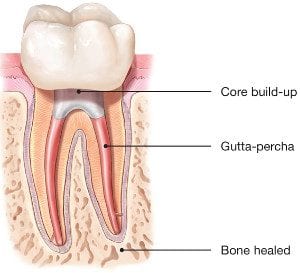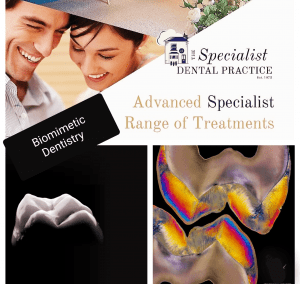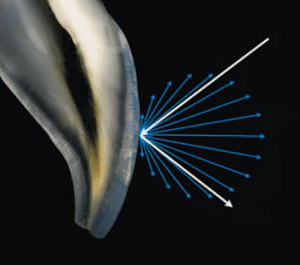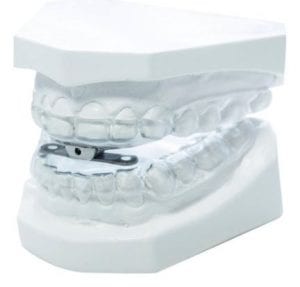
Specialist Endodontic Treatment
Nothing looks, feels or functions like your natural teeth, and endodontists are the experts in saving teeth. Keep smiling and eating the foods you love with endodontic treatment that can relieve your pain and save your teeth.
Sometimes your teeth may have infection or disease and will need additional care. When possible, you should always consider treatments to save your teeth. You may think, why not have a tooth pulled, especially if no one can see it, but you will know your tooth is missing and it will negatively impact your quality of life.
Don’t get a tooth pulled because you think its easier or more cost-effective. Missing teeth can cause other teeth to shift, affect your ability to properly chew and ruin your smile. Tooth extraction often is more painful than the infection itself, and replacing an extracted tooth with an artificial one requires additional dental visits that can quickly add up.
Modern endodontics offers advancements in technologies, procedures and materials, giving you many treatment options to save your natural teeth. It’s important to understand your choices and how they’ll impact both your tooth and your future dental health. It’s always best to retain your natural teeth whenever possible and endodontic treatment should be your first choice for the best health and cosmetic results. Endodontists are specialists in saving teeth. They can evaluate your condition and provide the best treatment plan to help you save your teeth for a lifetime.
Here are some tips for saving your teeth:
- When given a choice between tooth extraction and root canal treatment, always opt for a root canal. No denture, bridge or implant will look, feel and function as well as a natural tooth.
- Act immediately when you experience symptoms of swelling or pain. Most endodontists can accommodate emergency cases, even on weekends, ensuring you’ll be seen quickly.
- If your dentist recommends tooth extraction, ask whether the root canal is an option.If you’re told root canal is not an option, ask why and request a referral to an endodontist.
Root canal treatment from an endodontist is virtually painless and often leaves you with less discomfort during recovery than if you have your natural tooth extracted. Thanks to modern techniques and effective anesthesia, patients who experience root canals are six times more likely to describe it as painless than patients who have a tooth extracted! Take the time to learn more about root canal treatment and some of the common misconceptions about it and then take the first step to a pain-free, healthy mouth by visiting an endodontist.
How does endodontic treatment save the tooth?

It’s necessary to have endodontic or root canal treatment when the inside of your tooth (the pulp) becomes inflamed or infected as a result of deep decay, repeated dental procedures, faulty crowns or a crack or chip in the tooth. Trauma to your tooth may also cause pulp damage even if the tooth has no visible chips or cracks. If pulp inflammation or infection is left untreated, it can cause pain or lead to an abscess.
When you undergo a root canal or other endodontic treatment, the inflamed or infected pulp is removed and the inside of the tooth is carefully cleaned and disinfected, then filled and sealed with a rubber-like material called gutta-percha. Afterward, the tooth is restored with a crown or filling for protection and will continue to function like any other tooth.
Endodontic treatment helps you maintain your natural smile, continue eating the foods you love and limits the need for ongoing dental work. With proper care, most teeth that have had root canal treatment can last a lifetime.
For more detailed information on root canal or to organise for a consultation, call us or get in touch online.

What is Biomimetic Dentistry?

Translated literally, biomimetic dentistry means to copy what is life-like. Nature has provided the most successful and ideal properties to our natural teeth. When restoring damaged, broken, and decayed teeth, the goal is to return the tooth to its original strength, function, and esthetics. Biomimetic dentistry accomplishes all of this in a conservative, strong, and attractive approach.

Why is it so important?
Tooth preservation and dental conservation lie at the heart of biomimetic dentistry.
Biomimetic dentistry replicates the strength, function, and aesthetics of natural teeth by replacing only damaged, decayed, and broken tooth structure. The principle employs techniques and materials that provide a perfect balance of nature, art and science.

Teeth move, bend and have physical dynamics of force that must be accounted for while re-making the tooth with nature as our guide. Much of the amputation of tooth structure can be eliminated with modern science. We can say that tooth preservation and dental conservation lie at the heart of biomimetic dentistry.
The economic implications of not needing the advanced, invasive care seen in traditional (amputational) dentistry have profound positive effects on people’s lives. We can now help patients create healthy and happy mouths with simple, and often painless techniques!
Patients are happier and often spend less compared to conventional treatment.
Give us a call to find out more or book a consultation appointment.

As a condition that affects over 40% of the population, it is no surprise that the majority of us have been impacted by snoring in some way, shape or form. There are both varying degrees and varying types of snoring: it can be ‘simple’, or it can be symptomatic and may require further exploration. Regardless, there are a number of conditions associated, including:
- diminished energy
- lack of concentration
- increased risk of stress
- reduced libido
- high blood pressure
As well as the impact to the snorer, a lack of sleep on the bed partner’s behalf is also dangerous for their health and well-being. Many cases are reported by the bed-partner, with the snorer having very little awareness of their bedtime activities.

Thankfully, there are many interventions that can assist with snoring. Before discussing these, however, it is first important to highlight the cause.
What causes snoring?
Once we are asleep, our muscles relax. This can result in the soft tissues in the throat vibrating, causing the familiar snoring sound.
However, this doesn’t happen to everyone: there are a number of factors that can increase chances of snoring, including: obesity, gender, age, alcohol, and medication. For most sufferers, snoring occurs in isolation (simple snoring). In these cases, it is often the bed-partner that suffers, with the snorer unaware that they are causing such a disturbance. However, it can also take place as part of a more serious condition, obstructive sleep apnoea, which can be potentially life-threatening if not treated correctly.

What is obstructive sleep apnoea (OSA)?
OSA is a serious condition where, for short periods of time, the airway becomes blocked during sleep, cutting off oxygen reaching the lungs. There are two types of breathing disruption associated with OSA:
- Apnoea – where the muscles collapse sufficiently enough to cause a total blockage of the airway for 10 seconds or more
- Hypopnoea – partial blockage of the airway that causes an airflow reduction of more than 50% for 10 seconds or more
Both of these problems can occur several times throughout the night and are most commonly recognised by loud snoring, paired with snorts, gasps, or laboured breathing. This leads to disruption for both the bed-partner AND the sufferer, with the snorer often waking feeling tired due to a night with reduced oxygen intake.
There are many associations with obstructive sleep apnoea, and, due to fat distribution, middle-aged males are twice as likely to suffer from OSA in comparison to middle-aged females. The discrepancy does start to level out, however, believed to be due to hormonal changes after menopause.
What are the treatments for snoring?
Though many snorers and tired bed-partners typically look to their doctor for help when it comes to snoring, their dentist arguably has a larger part to play – initially at least.
As snoring is typically caused by the lower jaw dropping back during sleep, the easiest way to stop it is to prevent the jaw from slipping backwards. This can be achieved with a device called a Mandibular Advancement Splint (MAS). Available from trained dentists, there are a number of devices available, one of which is the Sleepwell.

The most clinically proven MAS for the treatment of snoring & mild to moderate sleep apnoea, the Sleepwell is a two-piece device that is fully-adjustable by the wearer, and designed to hold your lower jaw forward. Holistically, however, there may be other behaviours that could assist with the problem, such as:
- Sleeping position – lying on your back inevitably is the worst position for snoring. Trying different positions may have a positive effect.
- Bed-time ‘hygiene’ – avoiding alcohol or caffeine in the evenings can help. Both muscle relaxants, they can increase the chances of snoring.
- Weight-loss – holding excess fat around your neck can play a major role in both snoring and sleep apnoea.
Mandibular Advancement Splints are customised oral devices to help manage snoring. For more information, visit www.britishsnoring.co.uk, or call the practice for any further queries.










Recent Comments